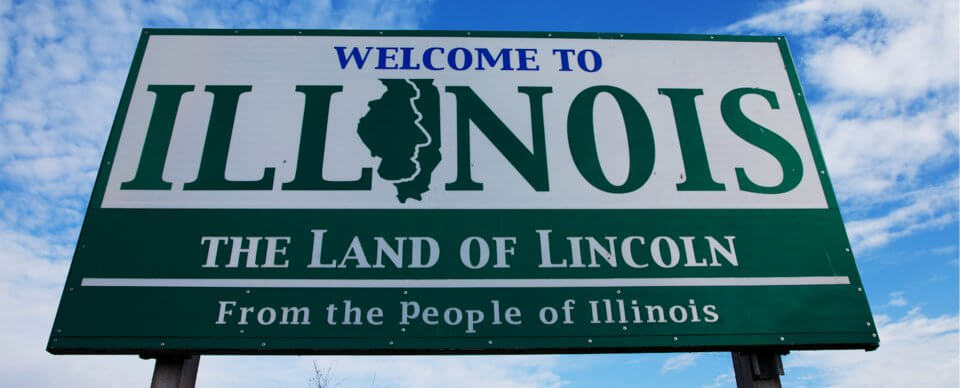
Whether you are new to the Prairie State or are a resident who is seeking Illinois car insurance for the first time, there are a number of minimum car insurance requirements you should be aware of before obtaining a policy.
Basic Illinois Car Insurance Requirements
States across the country are divided into categories of “fault states” and “no-fault states” when it comes to insurance. Illinois is considered a “fault state,” which means drivers are held financially responsible for car accidents they cause. Illinois drivers are required to have both liability insurance and uninsured motorist coverage.
- Liability insurance is the coverage that will help pay for injuries or property damage to others that result from an accident you caused. The two types of liability coverage are bodily injury and property damage.
- Uninsured and underinsured motorist coverage is coverage that will help pay for injuries to you and your passengers if you are involved in an accident with an uninsured driver or one who does not have enough insurance to cover your medical bills and property damage.
It is important to note that liability insurance will not cover your costs for personal injuries or property damage and uninsured or underinsured motorist coverage will not cover property damage.
Additional, optional coverage options in the state of Illinois include collision coverage, comprehensive, medical payments and uninsured motorist property damage coverage, among others.
Mandatory Illinois Vehicle Insurance Coverage
In Illinois, it is a legal requirement to carry specific types of car insurance coverage. Understanding these mandatory coverage options is essential to comply with the law and protect yourself from potential financial liabilities.
Liability Insurance
Liability insurance is a fundamental component of car insurance coverage and is required by law in Illinois. It provides financial protection to drivers in the event they cause bodily injury or property damage to others in an accident. You will often see these limits listed as 25/50/20. These limits are the most your insurance company will pay if you cause an at-fault accident.
Illinois minimum liability coverage requirements include:
Bodily Injury Liability
Bodily injury liability coverage helps pay for medical expenses, lost wages, and legal costs associated with injuries suffered by other parties involved in an accident where you are at fault.
- $25,000 per person
- $50,000 per accident
However, it is advisable to consider higher coverage limits to ensure adequate protection, especially in severe accidents where medical expenses can quickly escalate.
Property Damage Liability
Property damage liability coverage helps cover the costs of repairs or replacement of other parties’ property that you damage in an accident where you are at fault.
- $20,000 of property damage coverage
Again, it is wise to evaluate your needs and consider higher coverage limits, particularly when dealing with expensive vehicles or significant property damage.
Uninsured Motorist Coverage
Uninsured motorist coverage is designed to protect you when you are involved in an accident caused by a driver who lacks sufficient insurance coverage or is uninsured altogether. This coverage helps cover medical expenses and other damages resulting from the accident.
Uninsured Motorist Bodily Injury Coverage
Uninsured motorist bodily injury coverage provides financial protection if you are injured in an accident caused by an uninsured or underinsured driver. It helps pay for medical expenses, lost wages, and even pain and suffering, ensuring you are not left with the burden of expenses caused by an uninsured driver’s negligence.
Underinsured Motorist Bodily Injury Coverage
Underinsured motorist bodily injury coverage comes into play when the at-fault driver has insurance but insufficient coverage to fully compensate you for your injuries. This coverage bridges the gap between the at-fault driver’s insurance limits and your actual expenses, ensuring you receive adequate compensation.
In Illinois, uninsured and underinsured motorist coverage is required, and the minimum requirements mirror the bodily injury liability requirements: $25,000 per person and $50,000 per accident. However, it is essential to consider higher coverage limits to protect yourself comprehensively against potential medical expenses and other damages resulting from an accident.
What Happens if I Drive Without Car Insurance?
IL requires that any vehicle registered in the state will be insured for the length of the registration period. Illinois drivers are required to carry their insurance card on them at all times and to verify coverage to an officer during a traffic stop. The state also sends out random questionnaires to check for insurance. If you are selected you will receive a letter asking you to verify your coverage and you are required to respond within 30 days.
You can be fined $500 to $1,000 if you do not have the mandatory Illinois car insurance requirements. If you are cited again for lack of insurance it can result in the suspension of your driver’s license. If you cause a serious accident while uninsured you can even face up to one year in jail. If your license is suspended you may be required to file an SR-22 form annually to maintain your license once it is reinstated.
You may also be required to file an SR-22 if you have multiple traffic offenses, were convicted of a “Driving Under the Influence” or DUI charge and if your license was revoked.
What is an SR-22?
Financial Responsibility Insurance (SR-22) monitors high-risk drivers in the state of Illinois and authorizes the Secretary of the State’s office to suspend a driver’s license in the event of a lapse or expiration of car insurance.
Illinois requires that SR-22 insurance is maintained for a three-year period. While the cost to file an SR-22 is relatively low, drivers who are required to file one are considered high-risk and as a result their auto insurance premiums will be higher than the average driver in the state.
The cost of maintaining an Illinois auto insurance policy is certainly not worth the risk of driving without proper coverage. Connect with an insurance provider today to secure the best policy for your needs.
Getting the Best Rates for Car Insurance in Illinois
If you want cheap car insurance, Illinois law minimum liability limits will be the most affordable, but affordability isn’t always the main factor to consider when getting car insurance quotes. Illinois minimum limits are in line with most states in the country; however you have to consider what insurance coverage is best for you.
For example, if you caused an auto accident that injured three people and each of their medical expenses were $25,000 ($75,000 in total), your policy would pay $50,000. Would you be able to afford the remaining $25,000? If not, you may want to consider higher liability limits.
Discounts
While there are no discounts offered by the state of Illinois for car insurance, many insurance providers can give you discounts for coverage if you meet certain qualifications. Some insurance companies offer good student discounts and lower rates for people who take a defensive driving course. Discounts can be offered for drivers that have certain safety and anti-theft devices installed in their cars. When shopping for a car insurance policy, ask the insurance agent if they offer any of these discounts or others.
Alternatives to Car Insurance
Illinois state law doesn’t provide any real alternatives to buying mandatory car insurance in order to stay legal on their roads. However, if you own more than 25 vehicles, you can apply for self-insurance to be legally covered. In order to qualify, you must be able to pay the $200 application fee and provide evidence that you can realistically pay the same amount for claims as would an insurance company if your vehicle gets involved in an accident.
Typically, if you are caught driving without insurance or have a DUI, you’ll have to file an SR-22 certificate with your insurance company in order to prove to the state that you are insured. However, if you cannot get an SR-22 from an insurance provider, the state of Illinois will allow these alternatives to car insurance in order to keep you legal on the road:
- A $70,000 cash deposit to the Illinois State Treasurer
- A $70,000 surety bond
- A $70,000 real estate bond approved by a judge
If these alternatives are satisfied, proof must be sent to the Secretary of State for verification. Once everything is approved, the Secretary of State will issue a certificate to you that can be used in lieu of an insurance card. Frankly, it is much simpler to just find an insurance company willing to provide minimum coverage.
Looking for low-cost car insurance in Illinois?
Look no further than Freeway Insurance. Request an Illinois car insurance quote online or over the phone at 800-777-5620 and find out how much you can save.



